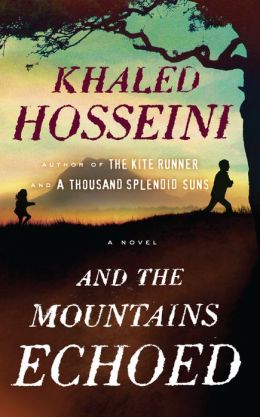 |
Khaled Hosseini’s And the Mountains Echoed was book of choice for our group in August. We decided that there were many ‘echoes’ in this book of loss, caring, coping and sacrifice. Similar to Hosseini’s other books, he dealt with complex human relationships and the fight between good and evil. Hossieni is a native of Afghanistan and now lives in California with his wife and two children. It was natural that this story followed this path.
The first and most important plot is that of the forced separation and eventual reunion of Abdullah and his sister Pari from the village of Old Shadabagh in Afghanistan. Due to dire poverty, their father Saboor decides to sell his three year-old daughter Pari to the wealthy employers of his brother Nabi, in the big city of Kabul. Ironically, when Pari’s 10 year-old brother learns of this, and wants to find her, his life gets in the way. At one stage he is a refugee on the move and eventually he emigrates to the US and doesn’t bother to search for her. It would have been relatively easy to find her, as her adoptive mother would have stood out as a famous poet in Paris. So, when Pari eventually tracks Abdullah down when he is old and suffering from Alzheimer’s disease, the reunion is a total anticlimax. Abdullah doesn’t recognize Pari so there is no connection. As the story unfolds, at first the reader is led to believe that the reunion of brother and sister is of vital importance. It is quite a let down that the eventual reunion was a bit of a non-event. |
|
As a group, we considered the introduction of a second, sub-plot where we met Varvaris Markos from Naxos in Greece a bit unnecessary and incongruous. This man came to live in Kabul in (Abdullah and Pari’s) Uncle Nabi’s house in 2002. Through him we learn about his mother Odie and her friend, Madeline whose daughter, Thalia, had her face grotesquely mutilated by one of Madeline’s husband’s crazy dogs. The majority of us felt that this sub-plot diluted the strength of the main plot and confused the reader with too many characters.
Uncle Nabi however, played the pivotal role in the separation of Abdullah and Pari as it was he who schemed for her to live with Nila and Mr. Wahdati in Kabul. There they were neighbors with young brothers Idrus and Timur in the 1970s. They return to Kabul as men in 2003 to try to claim back the family’s land. Although Idrus shows the most compassion towards Roshi (the little girl with the axed head) it is the ‘immoral’ Timur who actually changes her life. We discussed human weaknesses and how good and bad cannot be weighed up by one deed alone.
The general consensus was that this book is worth a read but Mr Hosseini has tried too hard this time by introducing too many characters and sub-plots. If he had stuck to the lives of the Afgan characters alone, it would have been a stronger book.
Submitted by Orla Govaerts |




